Eric Bana and Mia Wasikowska Talk ‘Blueback’
via Quiver Distribution/Zoom
Between them, Eric Bana and Mia Wasikowska have starred in billion-dollar franchises, Hollywood blockbusters, Oscar-winning movies, and acclaimed features from some of the biggest and best names in the business, but Blueback sees the duo returning to their roots in a moving independent production shot in their native Australia.
Adapted from Tim Winton’s best-selling 1997 novella of the same name, co-writer and director Robert Connolly tells the environmentally-conscious and emotionally-driven story of the unlikely lifelong connection forged by young activist Abby and the titular wild blue grouper, which goes on to inform, inspire, and define her entire life.
Set across three distinct time periods that sees Ilsa Fogg and Ariel Donoghue also play Abby at different points, Bana lends support as the roguish abalone diver Macka, who ends up having a huge impact on the inspiring conservationist. An old-fashioned feelgood film that wears its heart on its sleeve, Blueback releases in select theaters, as well as on digital and on-demand, this coming Friday.
Ahead of the release, We Got This Covered had the chance to talk to Bana and Wasikowska about the project, the difficulties of shooting on location during the pandemic, their own thoughts on the perils of climate change and much more, which you can check out below.
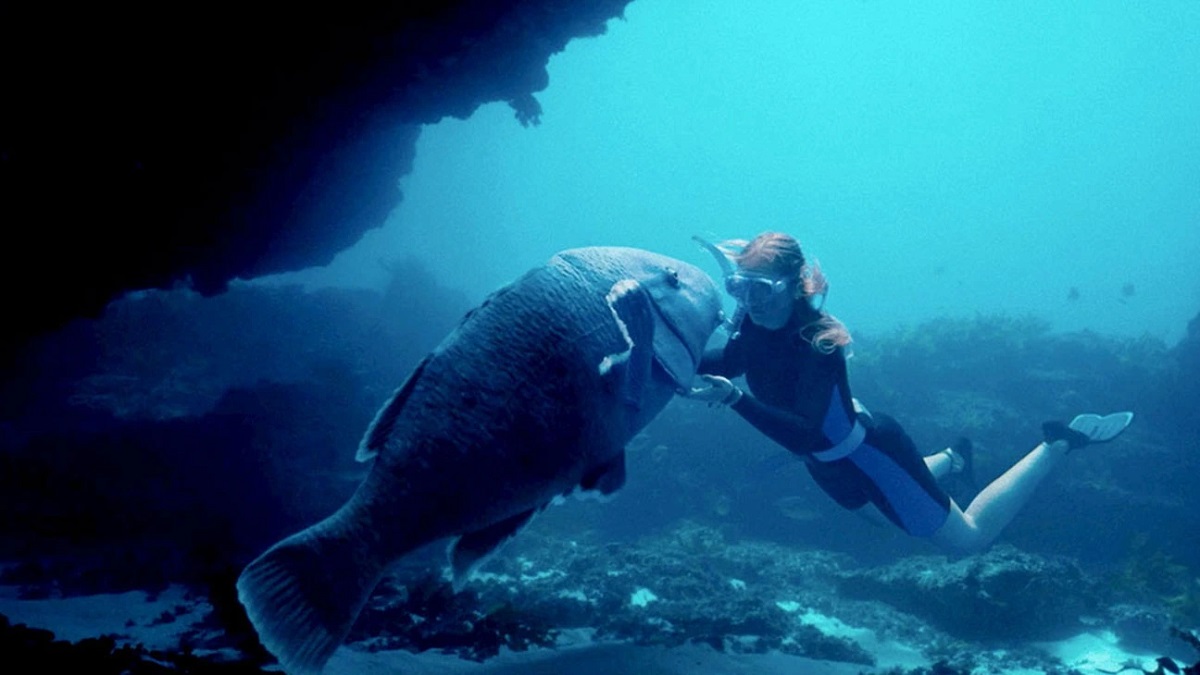
Robert Connolly had been developing the film pretty much since the novella was published, but were you guys overly familiar with the source material prior to getting involved in the project?
Mia Wasikowska: Yeah, Blueback is quite a classic here in Australia. I think that they teach it in a lot of school curriculums at the moment, actually. So it’s a pretty well-known story over here. Did you already know that as well?
Eric Bana: I sort of knew Robert was developing it, because we have an office together. And then one day he turned up with this polystyrene fish. And I was like, “What’s with the polystyrene fish?” And, and somebody in my office said, “Ah, that’s Rob’s next project.”
And I was like, “Okay,” and then the fish kind of got bigger and bigger! And then I suddenly put two and two together and realized that it was this is Tim Winton project. So yeah, I wasn’t as familiar, but I knew Rob had been developing it for quite some time.
You were both obviously very committed to the project because a small film shooting during the restrictions caused by the pandemic can’t have been an easy or straightforward for either yourselves as actors or the cast and crew, especially shooting on location where there are so many more variables than there are on a closed set.
Mia Waskikowska: Yeah, this was my only pandemic film, actually. So it was it was a bit of a mission to get there. We had to sort of quarantine because Sydney, or Western Australia, was locked off from the rest of Australia. So we had to quarantine for two weeks before we started filming.
Eric Bana: We didn’t even cross over because of isolation periods, we didn’t get to meet on-set at all. This is the most time we’ve spent on camera together, right now! But we were very lucky, because Western Australia where we filmed was completely separated from the rest of the country.
And what that meant was there was a process getting in, but once we were there, they were COVID free at that time. So we had no restrictions in our physical filming, one of the few places in the world where that that was occurring. So getting in was a bit of an ordeal. But once we were there, we were working on a normal film.
Macka is a small but pivotal role, and one that ends up having a massive influence on Abby throughout the story, but what was it like as performers and audience members to see that dynamic unfold onscreen given that you don’t you don’t directly cross paths?
Mia Wasikowska: Yeah, it was so crazy. I just love the film. I was so proud of it when I saw it. I was only there for two weeks, and maybe you were quite similar?
Eric Bana: Yeah, yeah. It was short.
Mia Wasikowska: So I felt like there was a whole movie that I hadn’t been a part of. And I just thought the girls did an amazing job. And it was so emotional. And to see the fish, which was a puppet, really come to life. It was just… I loved the film.
Eric Bana: Yeah, similar experience. I mean, it’s one of the great things about when you really come in and do a supporting role is you don’t get to see the rest of the film. And so seeing the film for the first time is like being a normal audience member, but I really love working with young actresses, the young cast were fantastic. And I love the dynamic between between Macka and Abby. So it was it was a lot of fun.
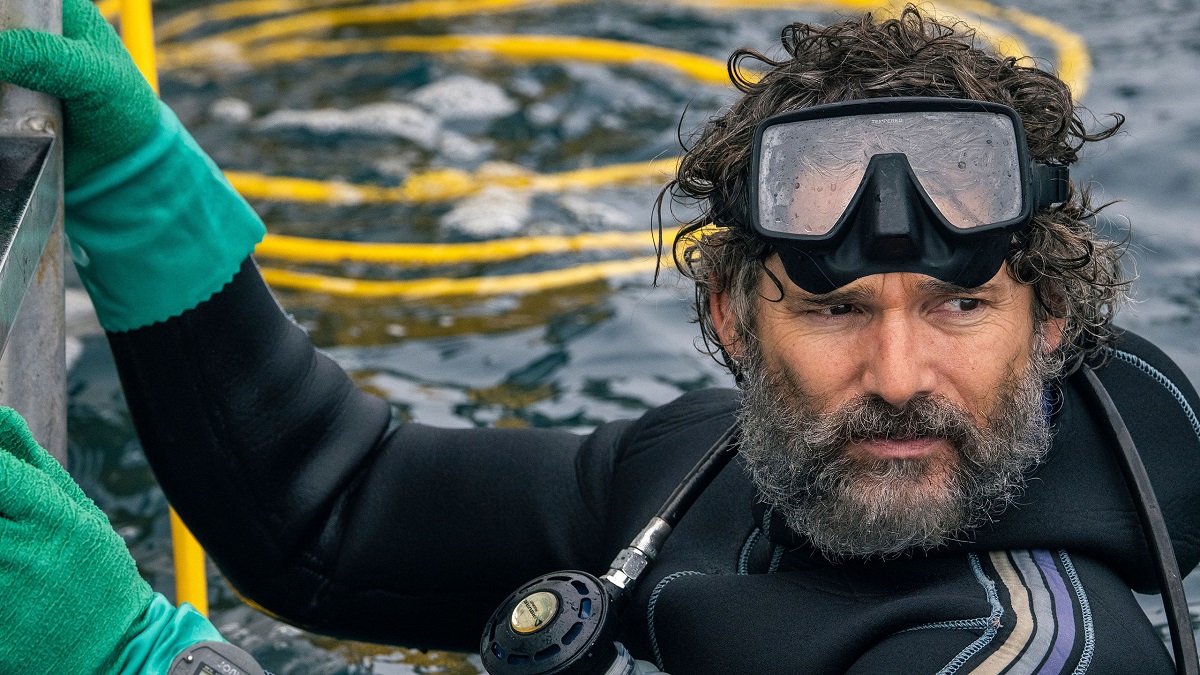
Mia, did you spend much time or have a lot of discussions with Robert, Ilsa, or Ariel at all to try and create a through-line of sorts for who Abby becomes from the first act to the last, or was your approach to more focus on where she was during the time you were playing her?
Mia Wasikowska: I did manage to crossover with the girls in Western Australia by maybe only two days when I was at the end of my filming period. And then they were about to start theirs. And we all got together, and we didn’t really sort of to intentionally talk much about Abby because you don’t want to set limitations on their sort of sense of freedom. But just to meet them and get a sense of who they were. It was really wonderful. And I think that they just did a brilliant job.
Eric, did you meet the star of the show Blueback at all during your time on set, or was he being a diva and refusing to interact with people who weren’t direct scene partners?
Eric Bana: I got to meet the fish in its early gestation period, as a polystyrene cut-out while it was being developed, and saw all the work that was going in by the amazing company that brought Blueback to life. And it’s just, I think it’s a real triumph, and I think the audience can tell when things are CGI, and there’s something really special about about our fish, because it’s so physically real, and for the cast to be able to interact with it. So it’s a piece of magic, it’s a little bit of old school filmmaking and puppetry and a lot of beautiful craft work that’s gone into it.
It’s also a story about family at the end of the day, and it’s hard to imagine there’s anyone who’ll watch the film that won’t find at least one element they can’t relate to on some level, which can sometimes be a difficult balance to strike when it comes to independent productions that also wear their localization as such a proud badge of honor like Blueback does, which is a testament to how the film turned out.
Mia Wasikowska: That’s true. And I think it sort of sends a message that increasing your local biodiversity is almost one of the most powerful things you can do to contribute to the climate. So it is universal, and then also quite focused locally.
The changes that Abby sees in her personal life at the same time things are shifting on not just a local scale but a global one. Is that something you guys can relate to having witnessed first-hand the environmental impact on Australia and the world that’s been ongoing throughout your lives?
Mia Wasikowska: Yeah, absolutely. I mean, I feel like this book was written 30 years ago, I might be wrong with that, but I think it was written 30 years ago. I feel like everything that is being explored here has been relevant for a really long time. But in some ways, only just. I mean, it’s a bigger topic that hopefully inspires people, especially the younger generations to sort of be a bit more conscious and use their energies in a positive way for the for the whole environment.
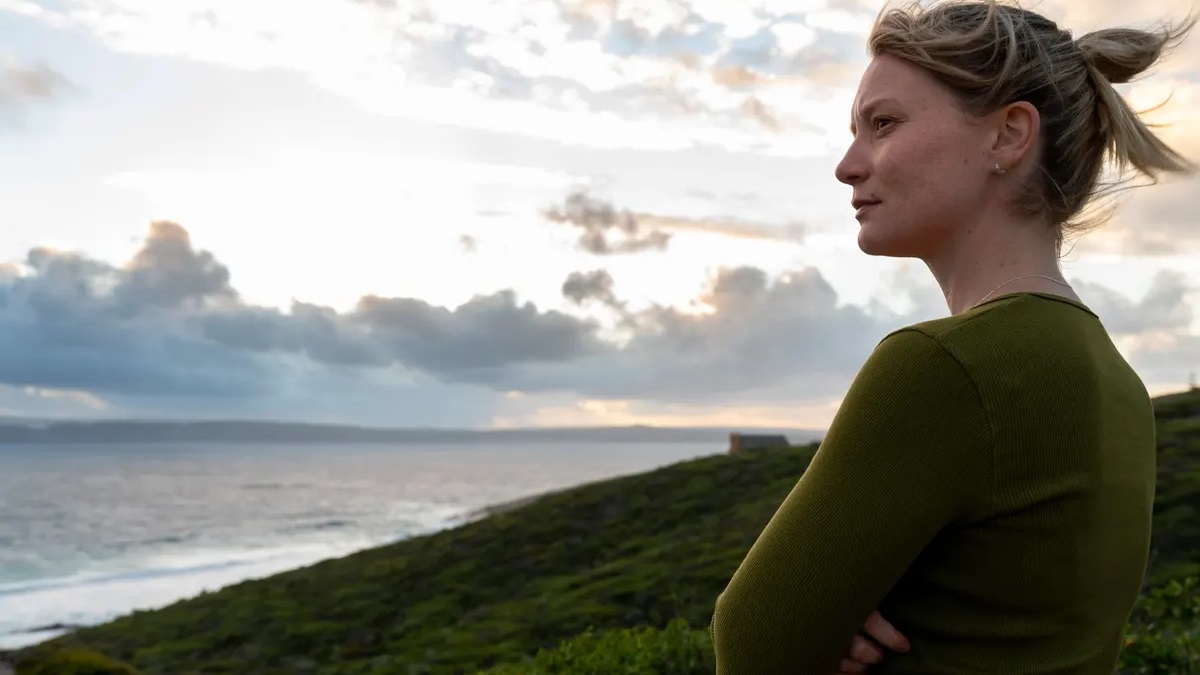
Robert said not too long ago that “the environmental movement has really embraced the idea of activism through optimism”, which is a fascinating way of looking at it, and something Blueback deals in from start to finish. Is that a sentiment you agree with, or are have you got a soft spot for the more direct approach if the occasion calls for it?
Eric Bana: There’s definitely room for both, but I do agree what Robert said there, because I think there’s so many serious issues that we are constantly being confronted with, and having to absorb, and feel like we have to take action on that it can be overwhelming. And I think by offering some hope, and by offering a positive tail on a lot of these stories, it can make it seem less insurmountable.
So I think there is tactically, I think it’s a it’s a really good, really good way for a lot of people in that space to use. Because I think as human beings, we do respond to that positivity as well. And otherwise, the goal feels like it’s it’s not as achievable. So I think I think it is a good way forward.
Mia Wasikowsa: I think you have to respect the fact that for young people, there’s so much anxiety with the world that they’re inheriting, and to offer some positivity and hope is sort of… I mean, that’s the only… otherwise you kind of go, “Oh, what’s the point?” And I feel like that’s really important for young people.
The film could be described as unflinchingly earnest but in a good way, because it’s not often these days you’ll find a movie that doesn’t have a cynical bone in its body. Blueback is told straight from the heart by everyone on either side of the camera, which is an approach you don’t really see often enough anymore, and one you both clearly gravitated towards.
Eric Bana: Yeah, it’s really honest. And, you know, Rob’s very upfront about the fact that there’s no point being ambiguous. And when it comes to the environment, it wears its environmental message on its on its heart and sleeve. And I think it’s worth it. It seems somewhat simplistic, but I think it’s the way to go, and I think people relate to that.
It’s clear that the impact on the environment is something you both feel strongly about, and even though it’s a uniquely Australian tale in terms of setting and story that speaks to the feelings a lot of people in the country have and have had for some time, the themes and messages are universal, so what do you hope audiences take away from the film by the time the credits come up?
Mia Wasikowska: I mean, I hope it’s inspiring. I found it inspiring! We get so much joy and connection, and from the ocean and from our environment. And the more that we take care of it, the more it’s a two-way street. It gives to us, and we give to it. So I just hope it’s inspiring for people.
Eric Bana: Yeah, same. I think I think Rob has done a beautiful job of capturing a natural environment and emotional environment where you realize that yeah, we do as humans get more out of nature than nature gets out of us, when it is a wonderful place to be. And there’s a simplicity in that, that I think just, you know, works well.
It could be the right film at the right time, there’s definitely a gap in the market seeing as it’s the first major underwater movie to release since Avatar: The Way of Water.
Eric Bana: We can only hope!
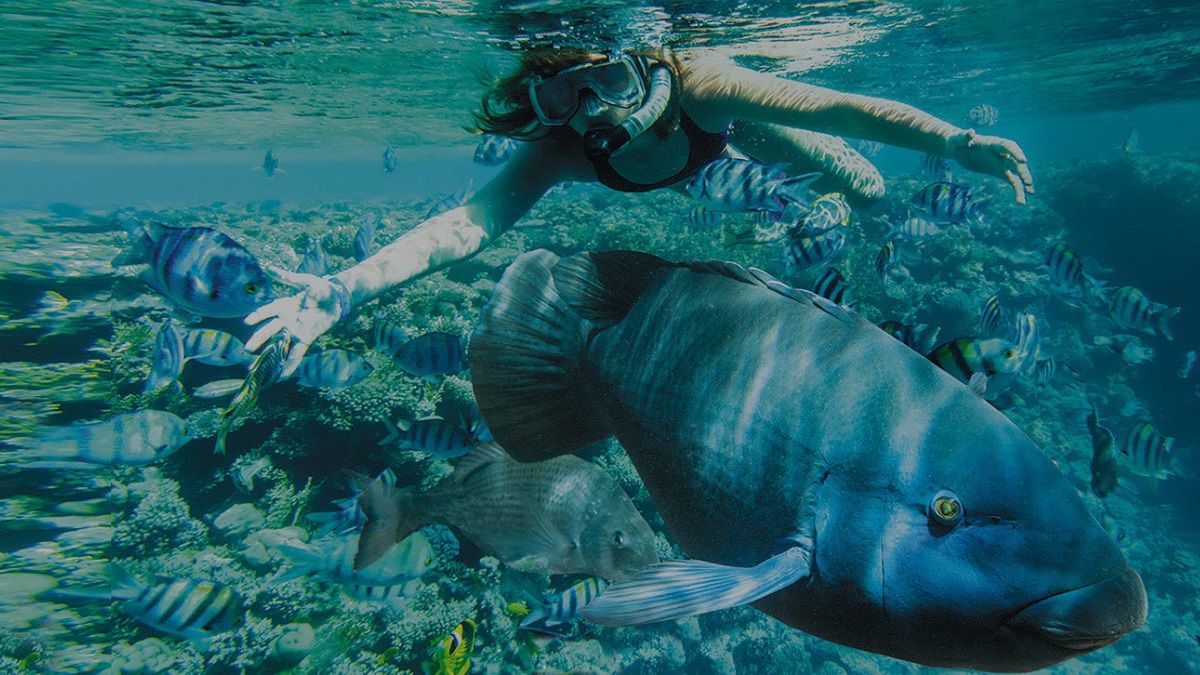
Eric, you of course previously worked with Robert on The Dry which was a massive hit in Australia and has become something of an unsung cult favourite around the world, so there’s going to be a lot of people excited for the sequel, if you’re not forbidden from sharing any details on that.
Eric Bana: Yeah, we shot the follow up – which is called Force of Nature – last year, and we’re just finished in the post-production phase, literally within the last couple of weeks. So we’re really excited. We’re thrilled with how the film’s looking, and looking forward to sharing that with Australian audiences and the rest of the world.
Probably towards the end of this year would be a rough guess. But no really, really excited. We again assembled an incredible cast and showing off another very, very interesting part of part of Australia, in another thriller. So it was a lot of fun to make. Really excited about it.
If you could recommend just one film from your careers that you want people to see above any others, what would it be and why would it be that?
Eric Bana: Over to you!
Mia Wasikowska: No, no, no, no, no, you go first! Oh, this one! I would recommend Blueback.
Eric Bana: Yeah, I have to recommend Blueback today. I think it’s one that if you sit down as a family, you’ll really enjoy.
That was a cop-out.
Eric Bana: Total cop-out!
Mia Wasikowska: No way, I’m serious!
Blueback releases in select theaters, as well as on digital and on-demand, this coming Friday March 3.
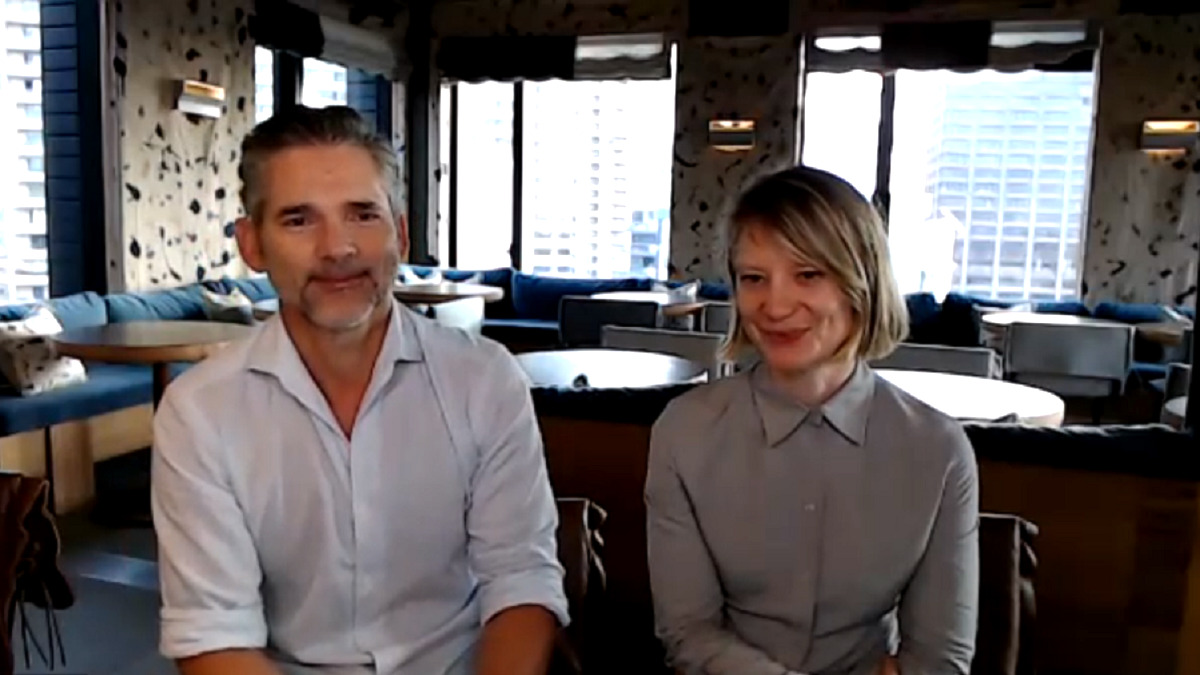
via Quiver Distribution/Zoom
Between them, Eric Bana and Mia Wasikowska have starred in billion-dollar franchises, Hollywood blockbusters, Oscar-winning movies, and acclaimed features from some of the biggest and best names in the business, but Blueback sees the duo returning to their roots in a moving independent production shot in their native Australia.
Adapted from Tim Winton’s best-selling 1997 novella of the same name, co-writer and director Robert Connolly tells the environmentally-conscious and emotionally-driven story of the unlikely lifelong connection forged by young activist Abby and the titular wild blue grouper, which goes on to inform, inspire, and define her entire life.
Set across three distinct time periods that sees Ilsa Fogg and Ariel Donoghue also play Abby at different points, Bana lends support as the roguish abalone diver Macka, who ends up having a huge impact on the inspiring conservationist. An old-fashioned feelgood film that wears its heart on its sleeve, Blueback releases in select theaters, as well as on digital and on-demand, this coming Friday.
Ahead of the release, We Got This Covered had the chance to talk to Bana and Wasikowska about the project, the difficulties of shooting on location during the pandemic, their own thoughts on the perils of climate change and much more, which you can check out below.

Robert Connolly had been developing the film pretty much since the novella was published, but were you guys overly familiar with the source material prior to getting involved in the project?
Mia Wasikowska: Yeah, Blueback is quite a classic here in Australia. I think that they teach it in a lot of school curriculums at the moment, actually. So it’s a pretty well-known story over here. Did you already know that as well?
Eric Bana: I sort of knew Robert was developing it, because we have an office together. And then one day he turned up with this polystyrene fish. And I was like, “What’s with the polystyrene fish?” And, and somebody in my office said, “Ah, that’s Rob’s next project.”
And I was like, “Okay,” and then the fish kind of got bigger and bigger! And then I suddenly put two and two together and realized that it was this is Tim Winton project. So yeah, I wasn’t as familiar, but I knew Rob had been developing it for quite some time.
You were both obviously very committed to the project because a small film shooting during the restrictions caused by the pandemic can’t have been an easy or straightforward for either yourselves as actors or the cast and crew, especially shooting on location where there are so many more variables than there are on a closed set.
Mia Waskikowska: Yeah, this was my only pandemic film, actually. So it was it was a bit of a mission to get there. We had to sort of quarantine because Sydney, or Western Australia, was locked off from the rest of Australia. So we had to quarantine for two weeks before we started filming.
Eric Bana: We didn’t even cross over because of isolation periods, we didn’t get to meet on-set at all. This is the most time we’ve spent on camera together, right now! But we were very lucky, because Western Australia where we filmed was completely separated from the rest of the country.
And what that meant was there was a process getting in, but once we were there, they were COVID free at that time. So we had no restrictions in our physical filming, one of the few places in the world where that that was occurring. So getting in was a bit of an ordeal. But once we were there, we were working on a normal film.
Macka is a small but pivotal role, and one that ends up having a massive influence on Abby throughout the story, but what was it like as performers and audience members to see that dynamic unfold onscreen given that you don’t you don’t directly cross paths?
Mia Wasikowska: Yeah, it was so crazy. I just love the film. I was so proud of it when I saw it. I was only there for two weeks, and maybe you were quite similar?
Eric Bana: Yeah, yeah. It was short.
Mia Wasikowska: So I felt like there was a whole movie that I hadn’t been a part of. And I just thought the girls did an amazing job. And it was so emotional. And to see the fish, which was a puppet, really come to life. It was just… I loved the film.
Eric Bana: Yeah, similar experience. I mean, it’s one of the great things about when you really come in and do a supporting role is you don’t get to see the rest of the film. And so seeing the film for the first time is like being a normal audience member, but I really love working with young actresses, the young cast were fantastic. And I love the dynamic between between Macka and Abby. So it was it was a lot of fun.

Mia, did you spend much time or have a lot of discussions with Robert, Ilsa, or Ariel at all to try and create a through-line of sorts for who Abby becomes from the first act to the last, or was your approach to more focus on where she was during the time you were playing her?
Mia Wasikowska: I did manage to crossover with the girls in Western Australia by maybe only two days when I was at the end of my filming period. And then they were about to start theirs. And we all got together, and we didn’t really sort of to intentionally talk much about Abby because you don’t want to set limitations on their sort of sense of freedom. But just to meet them and get a sense of who they were. It was really wonderful. And I think that they just did a brilliant job.
Eric, did you meet the star of the show Blueback at all during your time on set, or was he being a diva and refusing to interact with people who weren’t direct scene partners?
Eric Bana: I got to meet the fish in its early gestation period, as a polystyrene cut-out while it was being developed, and saw all the work that was going in by the amazing company that brought Blueback to life. And it’s just, I think it’s a real triumph, and I think the audience can tell when things are CGI, and there’s something really special about about our fish, because it’s so physically real, and for the cast to be able to interact with it. So it’s a piece of magic, it’s a little bit of old school filmmaking and puppetry and a lot of beautiful craft work that’s gone into it.
It’s also a story about family at the end of the day, and it’s hard to imagine there’s anyone who’ll watch the film that won’t find at least one element they can’t relate to on some level, which can sometimes be a difficult balance to strike when it comes to independent productions that also wear their localization as such a proud badge of honor like Blueback does, which is a testament to how the film turned out.
Mia Wasikowska: That’s true. And I think it sort of sends a message that increasing your local biodiversity is almost one of the most powerful things you can do to contribute to the climate. So it is universal, and then also quite focused locally.
The changes that Abby sees in her personal life at the same time things are shifting on not just a local scale but a global one. Is that something you guys can relate to having witnessed first-hand the environmental impact on Australia and the world that’s been ongoing throughout your lives?
Mia Wasikowska: Yeah, absolutely. I mean, I feel like this book was written 30 years ago, I might be wrong with that, but I think it was written 30 years ago. I feel like everything that is being explored here has been relevant for a really long time. But in some ways, only just. I mean, it’s a bigger topic that hopefully inspires people, especially the younger generations to sort of be a bit more conscious and use their energies in a positive way for the for the whole environment.

Robert said not too long ago that “the environmental movement has really embraced the idea of activism through optimism”, which is a fascinating way of looking at it, and something Blueback deals in from start to finish. Is that a sentiment you agree with, or are have you got a soft spot for the more direct approach if the occasion calls for it?
Eric Bana: There’s definitely room for both, but I do agree what Robert said there, because I think there’s so many serious issues that we are constantly being confronted with, and having to absorb, and feel like we have to take action on that it can be overwhelming. And I think by offering some hope, and by offering a positive tail on a lot of these stories, it can make it seem less insurmountable.
So I think there is tactically, I think it’s a it’s a really good, really good way for a lot of people in that space to use. Because I think as human beings, we do respond to that positivity as well. And otherwise, the goal feels like it’s it’s not as achievable. So I think I think it is a good way forward.
Mia Wasikowsa: I think you have to respect the fact that for young people, there’s so much anxiety with the world that they’re inheriting, and to offer some positivity and hope is sort of… I mean, that’s the only… otherwise you kind of go, “Oh, what’s the point?” And I feel like that’s really important for young people.
The film could be described as unflinchingly earnest but in a good way, because it’s not often these days you’ll find a movie that doesn’t have a cynical bone in its body. Blueback is told straight from the heart by everyone on either side of the camera, which is an approach you don’t really see often enough anymore, and one you both clearly gravitated towards.
Eric Bana: Yeah, it’s really honest. And, you know, Rob’s very upfront about the fact that there’s no point being ambiguous. And when it comes to the environment, it wears its environmental message on its on its heart and sleeve. And I think it’s worth it. It seems somewhat simplistic, but I think it’s the way to go, and I think people relate to that.
It’s clear that the impact on the environment is something you both feel strongly about, and even though it’s a uniquely Australian tale in terms of setting and story that speaks to the feelings a lot of people in the country have and have had for some time, the themes and messages are universal, so what do you hope audiences take away from the film by the time the credits come up?
Mia Wasikowska: I mean, I hope it’s inspiring. I found it inspiring! We get so much joy and connection, and from the ocean and from our environment. And the more that we take care of it, the more it’s a two-way street. It gives to us, and we give to it. So I just hope it’s inspiring for people.
Eric Bana: Yeah, same. I think I think Rob has done a beautiful job of capturing a natural environment and emotional environment where you realize that yeah, we do as humans get more out of nature than nature gets out of us, when it is a wonderful place to be. And there’s a simplicity in that, that I think just, you know, works well.
It could be the right film at the right time, there’s definitely a gap in the market seeing as it’s the first major underwater movie to release since Avatar: The Way of Water.
Eric Bana: We can only hope!

Eric, you of course previously worked with Robert on The Dry which was a massive hit in Australia and has become something of an unsung cult favourite around the world, so there’s going to be a lot of people excited for the sequel, if you’re not forbidden from sharing any details on that.
Eric Bana: Yeah, we shot the follow up – which is called Force of Nature – last year, and we’re just finished in the post-production phase, literally within the last couple of weeks. So we’re really excited. We’re thrilled with how the film’s looking, and looking forward to sharing that with Australian audiences and the rest of the world.
Probably towards the end of this year would be a rough guess. But no really, really excited. We again assembled an incredible cast and showing off another very, very interesting part of part of Australia, in another thriller. So it was a lot of fun to make. Really excited about it.
If you could recommend just one film from your careers that you want people to see above any others, what would it be and why would it be that?
Eric Bana: Over to you!
Mia Wasikowska: No, no, no, no, no, you go first! Oh, this one! I would recommend Blueback.
Eric Bana: Yeah, I have to recommend Blueback today. I think it’s one that if you sit down as a family, you’ll really enjoy.
That was a cop-out.
Eric Bana: Total cop-out!
Mia Wasikowska: No way, I’m serious!
Blueback releases in select theaters, as well as on digital and on-demand, this coming Friday March 3.
